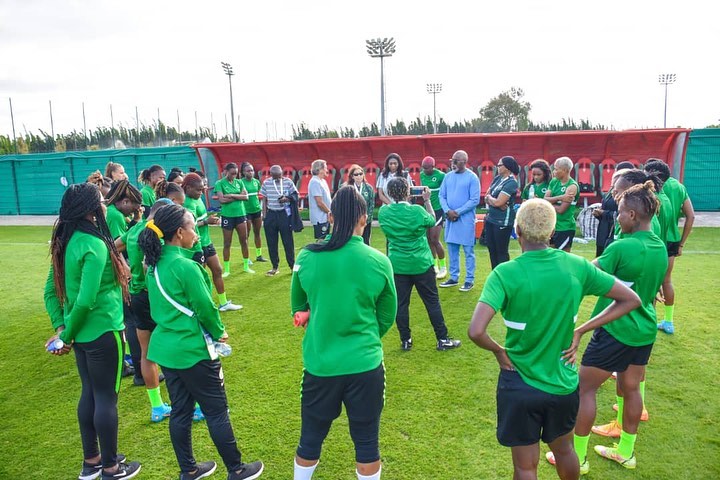
Nigerian football and its administration are not unused to scandals. Most shocking is the refusal to learn from awful episodes to turn a new leaf. For the second time in four years, the Super Falcons’ representation of the country ended as a sob story. In Morocco, the Super Falcons staged a protest over unpaid allowances and bonuses ahead of their third-place match defeat to Zambia. The football team boycotted a-day training, shunning all entreaties that their dues would be paid once the “intervention fund” from home matures.
It was the same payment row at the 2019 Women’s World Cup in France, where the ladies refused to leave their hotel rooms after losing to Germany and crashing out in the second round of the tournament. Then, the players claimed unpaid allowances for matches played in three years leading to the world cup, coupled with five-day camp bonuses for the tournament itself. In 2016, the ladies also had to protest to earn allowances and bonuses after winning the eighth WAFCON title. Things got uglier when the victorious side demonstrated at the National Assembly Complex to draw attention.
Ideally, to represent one’s country is one of the highest honours to bequeath to a citizen. That badge of honour and recognition of a national hero are far superior to whatever cash reward or allowances on offer. It is, therefore, a national disgrace that a country’s ambassadors would down tools to place personal benefits ahead of a national interest. The situation falls below the dignity of a fatherland and its individuals.
But the blame is that of the administrators rather than of the aggrieved ladies. The bone of contention is allowances and bonuses that had been agreed in the rules of engagement. It is unforgivable that while the players did sweat to grind out results, their managers are failing to keep their own end of the bargain. The administrators of football, like the political elite, have serially proven to be incapable of fidelity to pledges or an appreciable sense of national service. Not only had the ladies been let down in the past, they could see the same set of administrators living lavish lifestyles at major tournaments where the players should be the priority. Perhaps the Nigerian Football Federation (NFF) was broke to pay the ladies promptly, a very poor excuse at that; how does one explain that the same NFF packed the Nigerian camp with scores of officials, including 36 state FA chairmen and their cronies into Morocco, all-expense paid by the cash-strapped NFF? Such routinely reckless jamborees that attend competitions demonstrate a lack of accountability and sportsmanship for the growth of the game.
A more fundamental problem is the collapse of the civil service that should statutorily oil the machinery of governance and lead by example. Granted that the football federation prides itself as an autonomous body, a standard it rarely ascends, it is still under the supervision of the Ministry of Youth and Sports Development that should push for standards across the board. Beyond meddling with who becomes the next NFF president, the ministry should live by and in turn demand global best practices in all affairs of the Federation and sports generally. That has not been the case for several years, and it is most harrowing the scandals political jobbers are making of sports in the country.
The only upside for the Falcons is to have qualified for the next year’s World Cup in Australia and New Zealand – a handsome reward for making it to the semis in Morocco. But the truth is that Nigerian football has retrogressed in a world on the fast-forward. As shown in Morocco, several African nations that the Nigerian team used to blowout in past tournaments have outpaced the laggard Falcons. Even the style, pattern and fluidity of play of European nations show that they are light-years ahead in the development of female football. In South Africa where the Bayana Bayana won the trophy for the first time, the narrative is about having equal pay grade for both male and female footballers. Indeed, the stake is soaring higher for female football globally.
Curiously, Nigerian female football is dribbling backwards. While their male counterparts also struggle, the female league of yesteryears has gone into oblivion and unmarketable. The few sponsorship deals that the Nigerian Football Federation has managed to rack up in the prelude to AFCON earlier this year are, and for strange reasons, exclusive to the men national football team! Nothing is on the card for the women that are the most successful and most decorated national team in the country! It is tragic that such deals were made by NFF officials that are aware of the WAFCON outing ahead of them. Such tardiness is not the way to grow female professional sports, excite nationalism and encourage the female-folks to stick out a neck for the country.
That the footballers had to stage a public protest in Morocco is another dent on the soiled image of the country and those responsible for the show of shame should not go unsanctioned. It smirks of dereliction of duty that should not be condoned. The administrators need a change of attitude, or get shipped out. A game is only as enterprising as those playing it.






